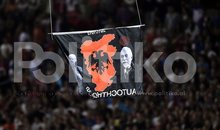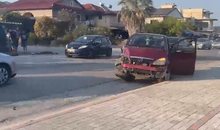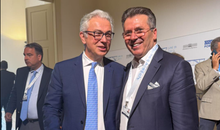
 Flash News
Flash News
One of the most powerful oligarchs in Bulgaria, who is the politician who lives in "mystery"?

Delyan Peevski, politician and one of the most powerful oligarchs in Bulgaria, is an enigmatic figure. Apart from a few hotels he is said to frequent, no one knows where he lives. He is rarely seen on the streets and prefers to be escorted to parliament by a convoy of cars and security guards.
However, if you ask any Bulgarian politician who is to blame for the current political crisis, as Bulgaria faces its seventh snap election in three years, most will likely point to the 44-year-old Peevski.
This oligarch has been operating behind the scenes for years. He controls most of the newspapers and media, and thus has a large hand in shaping public opinion.
In 2018, the international organization Reporters Without Borders echoed accusations of "corruption and interference between the media, politicians and oligarchs" in Bulgaria, which Peevski denies, saying that his political opponents put pressure on groups international human rights organizations to include his name in reports.
Having served as a member of Parliament since 2009, and held several state positions, including that of the head of Bulgaria's counterintelligence agency, Peevski has considerable influence over political figures and state institutions.
Political unrest
In 2023, this media mogul began to regularly attend parliamentary sessions and spoke to the media. At the beginning of 2024, he became the leader of the Movement for Freedom and Rights (DPS), the party that has traditionally represented the Turkish and Muslim ethnic minorities of Bulgaria.
In June, he led the party in the parliamentary elections, which came second, winning 47 of the 240 parliamentary seats in total.
While he has been a rising star in politics, Bulgaria has entered an unprecedented phase of political turmoil. From 2009 to 2021, the center-right party, GERB, led by Boyko Borisov, has led almost without interruption.
However, since 2021, Bulgaria has experienced six pairs of parliamentary elections.
GERB won four of them, but never managed to form the Government.
To an ordinary Bulgarian, Peevski is the epitome of the shadowy world of corruption and organized crime that many believe has engulfed the state.
He may be one of the least reliable politicians in Bulgaria.
In a recent poll, only two percent of Bulgarians said they trust him, compared to 88 percent of respondents who think otherwise.
Sipas Aktit Magnitsky, Shtetet e Bashkuara kanë vendosur sanksione ndaj Peevskit, duke e akuzuar atë për korrupsion dhe ndikim, “me qëllim të mbrojtjes së vetes nga gjyqi publik, dhe që të shtrijë kontrollin në institucione dhe sektorë kyç shtetërorë”.
Mbretëria e Bashkuar ka vendosur, gjithashtu, sanksione ndaj tij, duke thënë se Peevski është përfshirë “në tentimet për të ushtruar kontroll në institucionet dhe sektorët kyç të shoqërisë bullgare, përmes ryshfetit dhe përdorimit të mediave të veta”.
Peevski, në anën tjetër, si manjat mediash dhe politikan, ka nisur kontekst ligjor ndaj sanksioneve dhe mohon vazhdimisht akuzat që rëndojnë ndaj tij.
Ai ka nisur proces gjyqësor në SHBA për heqje sanksionesh, duke pretenduar se akuzat janë të motivuara politikisht.
Partner “toksik”
Reputacioni i tij i dëmtuar nënkupton që shumë politikanë bullgarë tani refuzojnë të punojnë me të.
Për ta, Peevski është “toksik”, ka thënë Dimitar Bechev, ligjërues në Shkollën e Oksfordit për Studime Globale, si dhe hulumtues i lartë në Institutin Carnegie Europe, me bazë në Bruksel.
Hristo Ivanov, njëri prej liderëve të koalicionit reformist pro-perëndimor, Ne vazhdojmë ndryshimin – Bullgaria demokratike (PP-DB), i ka thënë Shërbimit bullgar të Radios Evropa e Lirë, më 30 korrik, se “problem thelbësor i Bullgarisë është ‘shteti i kapur’, i cili në vjetët e fundit është personifikuar më së shumti me Peevskin”.
Shumë politikanë bullgarë tani kanë nisur të besojnë se çdo bashkëpunim me këtë manjat mediash do t’ua humbë votat.
Koalicioni, Ne vazhdojmë ndryshimin – Bullgari demokratike (PP-DB), veçse mund t’i ketë parë pasojat e një bashkëpunimi të ngushtë me partinë DPS të Peevskit në periudhën, qershor 2023 deri në prillin e këtij viti.
Në zgjedhjet e fundit parlamentare të Bullgarisë, të mbajtura në qershor, mbështetësit e tij e kanë braktisur koalicionin në masë.
Partia GERB, e cila ka punuar ngushtë dhe publikisht me Peevskin, është përballur së fundmi me gjakderdhje të vazhdueshme, sa i përket mbështetjes së votuesve.
I lëkundur për reforma
Politikanët bullgarë e kanë akuzuar Peevskin edhe për lëkundje të vazhdueshme kur ka qenë fjala për reforma.
Në kohën e krijimit të një koalicioni mes dy partive më të mëdha politike në Bullgari, në atë kohë, GERB dhe PP-DB, që kanë udhëhequr shtetin më 2023-2024, të dyja partitë janë zotuar për ndihmë ushtarake për Ukrainën, mbështetje ndaj euros, dhe anëtarësim të plotë të Bullgarisë në zonën Schengen.
Megjithatë, PP-DB, e prirë për më shumë reforma, ka propozuar edhe masa që do të zvogëlonin fuqinë e Prokurorit të Përgjithshëm dhe zhdukjen e ndikimit rus në shërbimet e sigurisë.
Kur GERB i ka tërhequr këmbët prej reformave të propozuara, koalicioni qeveritar është shpërbërë në mars.
Në një intervistë dhënë Radios Evropa e Lirë në prill, Nikolay Denkov, njëri prej kryeministrave me rotacion në Qeveri, e ka fajësuar Peevskin për rritje të presionit ndaj GERB-it dhe liderit të asaj partie, Boyko Borisov, që të prishet koalicioni qeverisës.
Peevski was afraid of the reforms, Denkov said, and managed to influence Borisov.
"I saw it with my own eyes... we went to the meeting and Peevski was sitting near Borisov", he said.
"In fact, during those months, 80 percent of the time, the conversations took place with Peevski and not Borisov."
After the last elections in June, Borisov distanced himself from Peevski.
His party, GERB, has won the election and DPS has come second, the two parties could form the government, with a little support needed from some independent MPs.
However, Borisov has said several times that he does not want to govern only with DPS and Peevski.
Deep party divisions
There are many who see the upcoming parliamentary elections, scheduled for October, as a turning point, due to deep party divisions within Peevski's DPS.
After ascending to the head of the party, in early 2024, Peevski began to remove from the party, members who are close to Akhmed Dogan, the former long-time leader of the DPS party.
This faction is now fighting him, and Dogan himself – honorary leader of the party – is demanding Peevski's resignation.
As a result of divisions within the party, analysts have said that Peevski may fail to secure a seat in Parliament, or will have too few lawmakers close to him.
Other parties have discussed the possibility of Peevki's isolation in the upcoming October elections.
"We have to accept that we will work with those who are against Peevski in the DPS", said Ivanov from the PP-DP coalition.
"Finally, we must have wise strategies, when opportunities arise, and get rid of corruption in the state."
Bulgaria is facing all these developments at a time when it is also isolated in the European Union and is losing support in the European bloc.
Bulgaria is the country with the highest rate of poverty and corruption in the EU.
The head of the EU, Ursula von der Leyen, is waiting for Bulgaria to propose a European commissioner, but the political situation has meant that Sofia has not yet made a decision.
Although the EU has accepted an economic plan worth 6 billion euros, Bulgaria has little chance of seeing those funds until it completes the reforms required by the EU, including taking anti-corruption measures. .
The political situation inside Bulgaria may have also damaged regional security.
Sofia is not actively involved in regional security discussions, said Matthew Boyce, a senior fellow at the Washington-based Hudson Institute who served for a time as a deputy assistant in the US secretary of state's office.
Vessela Tcherneva, deputy director of the European Committee for Foreign Relations, has warned that "if the state does not manage to get out of this political blockade", then this situation "will increase the possibility that states like Russia will have influence on an EU member state and NATO".
REL
Latest news


Not only the body, swimming also helps the brain
2025-07-05 21:02:49
"Be careful with the water", Alimehmeti warns about the health risks of summer
2025-07-05 20:39:10
PSG beats Bayern Munich 2-0, advances to Club World Cup semifinals
2025-07-05 20:19:38

Two vehicles collide on the Elbasan-Peqin axis, drivers injured
2025-07-05 19:26:29

What does Zelenskyy have more than Zegjineja?
2025-07-05 18:45:26

Fiscal peace, but at a cost
2025-07-05 18:00:10
'Bankers' tax evasion, Chinese CEO and former director jailed
2025-07-05 17:39:21
Kyle Walker joins English club on two-year deal
2025-07-05 17:20:24
Two cars collide on the Saranda-Delvina axis, 4 injured
2025-07-05 17:05:29
Touching gesture! Liverpool will pay Jota's family's salary until 2027
2025-07-05 16:45:18
The zodiac signs that cheat most often
2025-07-05 16:25:53

"I asked for the dismissals", Dredha tries to soften Rama's 'blow' in Vlora
2025-07-05 15:48:49
Bomb threat in Parliament, prosecutor: It was a lie
2025-07-05 15:22:28

Bardhi: The recount revealed how greedy Zeqine Balluku is in stealing
2025-07-05 14:44:29
Knife wound on the secondary road Tirana-Durrës, perpetrator sought
2025-07-05 14:37:54
Tears and pain, Diogo Jota is escorted to his final home
2025-07-05 14:21:34
Success starts with yourself! Simple ways to invest in personal development
2025-07-05 13:58:50
Unlicensed firearms found in apartment, 50-year-old arrested in Lushnje
2025-07-05 13:43:11

Tirana Court remands Skerdi Sina to prison
2025-07-05 12:59:34
Cocaine laboratory in Greece, here are the Albanians arrested and wanted
2025-07-05 12:40:16
Directed Justice/Vangjeli: SPAK does not investigate any scandal involving Rama
2025-07-05 12:22:03

Bomb alert, Police remove MPs and media from Kosovo Parliament building
2025-07-05 11:48:16
"The will of the people" and the irony of ordered resignations
2025-07-05 11:32:05
Summer drowning risk: How to enjoy the water without risking your life
2025-07-05 11:20:27
Fire situation in the country, 16 fires reported in 24 hours, 4 still active
2025-07-05 11:07:04
Car hits pedestrian at white lines, injured in serious condition in Vlora
2025-07-05 10:59:58
Mosquito-borne diseases are a growing problem in Europe
2025-07-05 10:44:13



One of Sweden's most dangerous and wanted criminals arrested in Turkey
2025-07-05 09:38:29
Foreign exchange/ How much foreign currencies are bought and sold today
2025-07-05 09:18:38

"Don't be influenced by the opinions of others", today's horoscope
2025-07-05 08:40:50

Morning Post/ In 2 lines: What mattered yesterday in Albania
2025-07-05 08:02:07

Trump says he's ready to raise tariffs to 70% on some countries
2025-07-04 22:35:52
Tre shenjat e zodiakut që do ‘pasurohen’ në Korrik
2025-07-04 22:05:09
Gaza War: Hamas Accepts US Proposal for 60-Day Ceasefire
2025-07-04 21:50:10
Autocracy in Albania, Fuga: Governance has gotten out of control
2025-07-04 21:40:51
Meta: Agriculture on credit, the new fraud!
2025-07-04 21:26:39




Vote recount in Durrës ends without changes
2025-07-04 20:12:54
Gas station explodes in Rome, 25 injured (VIDEO)
2025-07-04 20:00:20

These afternoon habits often sabotage weight loss
2025-07-04 19:39:28
Former Arsenal player Thomas Partey accused of rape
2025-07-04 19:24:21
Shepherd disappears without a trace in Delvina
2025-07-04 19:14:31

Bardho gave Zegjine's mandate/Braho: Unfair! It violates the electoral system
2025-07-04 19:01:08


Rapid developments in the Sultanates!
2025-07-04 18:00:06



Italy tightens rules for skateboard traffic
2025-07-04 17:20:18

Unusual for the time, dense fog covers the coast of Vlora
2025-07-04 16:48:01


Accident on the Shkodra-Lezhë axis, one dead and 3 injured
2025-07-04 16:14:19
Albania with fewer requests for asylum and Albanian citizenship in 2024
2025-07-04 16:06:57

Albania last for quality of life, DP: Technical government is the solution!
2025-07-04 15:42:30
Nico Williams says "No" to Barcelona, signs with Athletic Club until 2035
2025-07-04 15:33:35
Fires in the country, four fires are still active, what is the situation?
2025-07-04 15:24:20

Summer brings big changes for these 4 zodiac signs
2025-07-04 15:00:04
Osmani: MPs need to agree to a secret ballot for the Speaker of Parliament
2025-07-04 14:51:09
Serious accident on the Peqin-Elbasan axis, two injured
2025-07-04 14:37:56

GJKKO leaves in force the security measure for the head of the KPP
2025-07-04 13:58:17
Who will replace Ilir Meta and take over the leadership of the PL?
2025-07-04 13:50:36
Berisha: Dismissal of directors in Vlora, another act of 'scapegoats'
2025-07-04 13:41:46




Librazhd/ In a serious psychological state, the young man consumes pesticides
2025-07-04 13:05:07


Weapons trafficked from Kosovo to Albania, two arrested, 8 pistols seized
2025-07-04 12:33:28
Konsumimi i tepërt i çokollatës, ja cilat janë dëmet që shkakton në organizëm
2025-07-04 12:23:35

Fires in the country, 21 fires in the last 24 hours, 4 still active
2025-07-04 12:00:19
WB calls for debt transparency: Albania to publish details of every loan
2025-07-04 11:50:05
